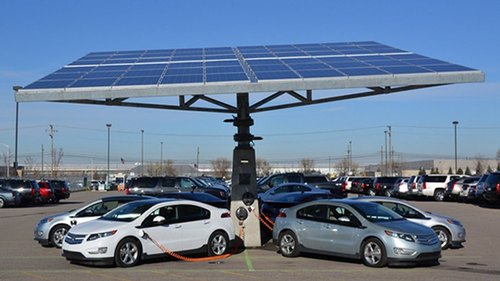
Introduction
Solar energy has emerged as a promising solution for electric vehicle (EV) charging, providing a sustainable and environmentally friendly alternative to traditional power sources. This article will explore the importance and potential benefits of using solar energy for EV charging.
Historical Background
Solar energy has a rich history dating back to ancient civilizations. From the discovery of photovoltaic (PV) panels to the evolution of electric vehicles, the development of both industries has paved the way for solar-powered EV charging.
Key Concepts and Definitions
Understanding the key concepts and definitions surrounding solar energy and electric vehicles is essential. This section will explore solar PV panels, electric vehicles, battery storage systems, and differentiating between grid-tied and off-grid systems.
Main Discussion Points
Overview of Solar Energy Systems for EV Charging
Solar energy systems for EV charging come in various types, each with its own unique characteristics. This section will delve into the different types of solar energy systems, the components that make up a solar charging system, and the process of converting solar energy into usable electricity for EVs.
Benefits of Solar Energy for EV Charging
The benefits of using solar energy for EV charging are multi-faceted. It not only contributes to reducing carbon emissions, but also offers cost savings and the potential for self-sufficiency. Additionally, solar energy integration promotes increased energy independence and resilience.
Integration of Solar Energy and the EV Charging Infrastructure
The integration of solar energy and the EV charging infrastructure is crucial for maximizing the benefits of both technologies. This section will explore smart charging solutions, load management techniques, and the potential benefits of Vehicle-to-Grid (V2G) technology. Additionally, the impact on the electricity grid and utility systems will be discussed.
Case Studies or Examples
Real-world examples highlight the effectiveness and impact of solar-powered EV charging. Case studies of solar-powered EV charging stations in specific locations and the integration of solar energy and EV charging at particular companies or organizations will be presented, showcasing the successful implementation process, challenges faced, and the resulting benefits.
Current Trends or Developments
The solar-powered EV charging industry is experiencing significant growth and advancement. Increased investment, advancements in solar PV technology and efficiency, and the integration of renewable energy with smart grids and V2G technology are current trends that will shape the future of solar energy for EV charging.
Challenges or Controversies
While solar energy for EV charging presents numerous benefits, there are also challenges and controversies that need to be addressed. Limited availability of charging infrastructure in certain regions, grid integration challenges, and cost and scalability considerations for widespread adoption will be discussed in this section.
Future Outlook
The future of solar-powered EV charging is promising, with potential growth and expansion on the horizon. Technological advancements and cost reductions will further enhance the viability of solar energy for EV charging. Additionally, policy and regulatory implications will play a vital role in promoting solar energy in the transportation sector.
Conclusion
In conclusion, solar energy for EV charging offers a sustainable and environmentally friendly solution for powering electric vehicles. The potential benefits, integration with the EV charging infrastructure, and current trends highlight the importance and potential of solar energy in the transportation sector. Further research and exploration of this topic are encouraged.